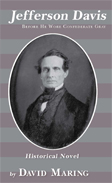
 |
Jefferson Davis, the first and only president of the short-lived Confederacy, has long been eclipsed in stories about the American Civil War by his charismatic general, Robert E. Lee. While Lee is frequently held up as an honorable man who felt obligated by his love for his home state to fight for the losing side, Davis, in contrast, is usually portrayed as either a villain or a witless fool. In reality, Davis was neither of these as the author shows in his highly readable historical novel.
Beginning in Davis' boyhood and ending shortly after the popular war hero has reluctantly assumed the leadership of the new Confederate States of America, Maring chronicles the multitude of personal and political struggles Davis faced as he slowly rose to national prominence. A native of Mississippi, he was the youngest child of a Southern planter whose debts when he died prevented his son from finishing his university studies and pursuing a career in law. Instead, Davis' older brother, Joseph, got him into West Point. Although his often rebellious attitude toward authority made him unsuited for a long-term military career, his various successes in this arena gave him a credibility that would help shape his future. His friendships and political connections helped him along the way, as well, eventually opening the way for him to serve in Washington first as a U.S. Representative, then as a Senator, and finally as Secretary of War under President Franklin Pierce. His popularity was such that a place in the White House might have been in his future, as well, but his loyalty to Mississippi, his interpretation of the Constitution in the area of states' rights, and the widening rift between the North and the South forced him along a different path.
Maring's writing is straightforward and unpretentious, a quality that normally would make this biography ideal for the middle grades and up. However, some of Davis' encounters with the various women in his life, while not as sexually graphic or extensive as one might find in a Nora Roberts novel, gear this book more for adult audiences. Where Maring shines the most, though, is in his ability to show the true man, with all his strengths and weaknesses, behind the historical figure. Maring reveals Davis as both brave and insecure, as desiring personal wealth and power, but also caring deeply for the common man. The Jefferson Davis Maring portrays is one who saw other races as inferior yet who refused to dehumanize his slaves through the use of corporal punishment or by splitting up their families, a man who was viewed by many as cold and unfeeling but who cried like a baby at the funeral of James Pemberton, his personal negro servant, plantation manager, and confidant. Using quotes from letters Davis and his wife, Varina, wrote to each other to support his points, the author also shows the tensions in Davis' second marriage as the couple fought a domestic battle exacerbated by age differences, maturity levels, and varying outlooks on life.
The author's story of one of the least understood figures of the Civil War era is both well-written and riveting. It manages to replace the cardboard cutout of the leader of the Confederacy with a flesh-and-blood human.
RECOMMENDED by the US Review